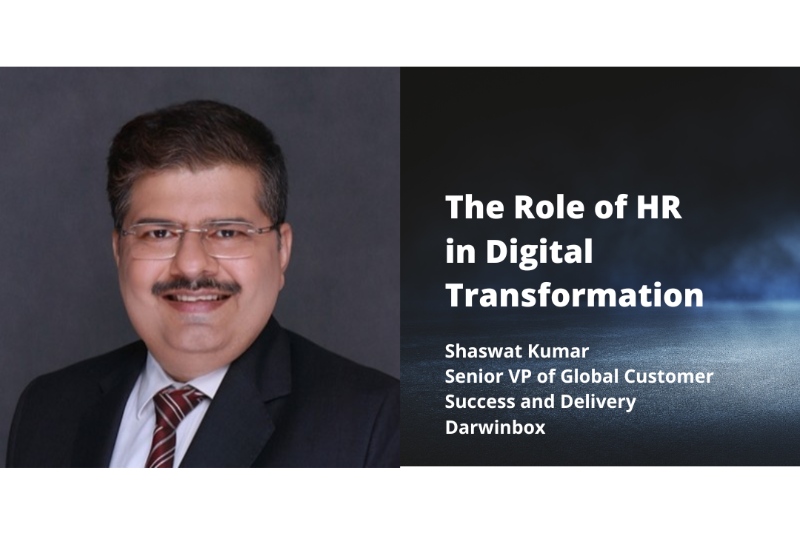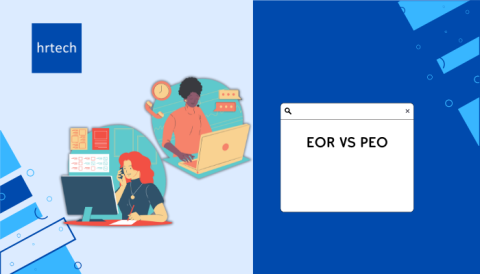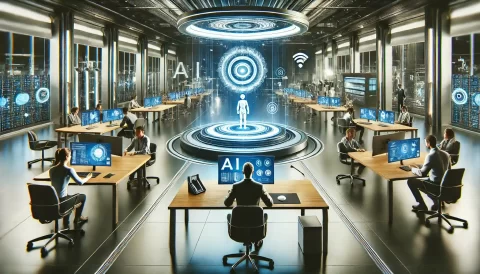Enterprises will accelerate their pursuit of digital HR initiatives as technology continues to be a significant driver in the transformation of HR activities.

As enterprises embrace a hybrid workplace format, they are accelerating the adoption of “digital” and the HR function is now being entrusted with the task of leading Digital Transformation. HR teams, who have traditionally been playing a support role, are now provided with a great opportunity to leverage this new responsibility to be seen and valued as a Strategic Business Partner.
In my discussion with Shaswat Kumar, who recently joined Darwinbox as the Senior VP of Global Customer Success and Delivery, he speaks about the accelerated digital adoption in the hybrid workspace & the new Role of HR in Digital Transformation.
Kumar joins Darwinbox with two decades of multi-geographical and multi-cultural experience in helping businesses with their HR transformation journeys. In his former role at Alight solutions as the Asia Leader, he helped to establish the firm as the preferred partner for HR and Business solutions and was responsible for crafting and executing regional expansion strategies that positioned Alight as a dominant player in the region. Before Alight, he was a practice leader and partner at Aon, specialising in HR transformation for large clients across the Asia Pacific, Middle East and Africa. He was part of the Aon Hewitt HR Effectiveness Group in the early 2000s, at a time when HR transformation was still a very new practice. Now, Kumar’s appointment comes shortly after Darwinbox was named to Gartner’s Magic Quadrant for Cloud HCM Suites 2021, making it the youngest and only Asian firm on the list. His addition to the leadership team is expected to contribute significantly towards fast-tracking Darwinbox’s growth.
Here are the excerpts from the Q&A session that I had with Shaswat recently.
- In the new hybrid workplace, what is the role of HR in Digital transformation? What are key trends that you are witnessing in the workplace that will be a gamechanger for HRTech adoption?
Shaswat: Hybrid workplace is a new reality and how organisations will configure it for themselves will depend on their specific requirements. All Digital Transformations are about organisational change, for which HR has been and will be the key stakeholder. However, in todays’ offline and online world, this is a bigger challenge as the workforce and the workplace become more distributed and dispersed. Organisations that get this right will see an acceleration in their ability to change and drive business results.
To make this happen HR will have to address multiple themes. Some key themes that the organisations will need to grapple with will be employee engagement & well-being; overcoming the challenge of collaboration & innovation; and the need to manage & drive productivity. These themes find a common solution in HR Tech, which enables organisations to not only address the themes but also bring about operational efficiency and value realization. HR Technology, today, is a part of the Work Technology stack, which has resulted in uptake and adoption as it seamlessly embeds in an employee’s flow of work (and life). Specifically, on HRMS trend spotting, demand for new feature sets and better experience will accelerate as the world of work continues to evolve.
- Why do organisations hesitate to invest in HR Tech? How does Darwinbox help your client HR teams in getting the requisite leadership buy-in for HRTech investment?
Shaswat: HR leaders see the need for a new-age HR Technology platform. Period. However, leaders are hesitant to start this transformation journey because the track record of success around these initiatives in the market is patchy, to say the least. At Darwinbox, we work with HR leaders to help establish the need for change with their business leadership early in the process. In most cases, this happens even before the sale has happened. This process is appreciated by our customers because business leaders are able to envision the outcomes needed from HR and HR Technology which will further help them in realizing their business vision.
Once this is articulated, Darwinbox’s unique deployment approach Inflexion is designed to ensure the success of the implementation journey. We are fully cognizant of each organisation’s unique culture, and we adjust our approach and pace to make the transformation a success. In general, we believe that going live sooner helps with accelerating both adoption and ongoing improvement. On this, we support our customers with a pool of very experienced Customer Success Managers (CSM). These dedicated CSMs act as true partners on the overall transformation journey and keep checking in to ensure that immediate challenges are tackled keeping the big picture in mind.
It is a combination of all of the above, which has resulted in a very high level of client success for us which is reflected highest rating of 4.8 among of global HCM products in “Peer Insights by Gartner”.
- What are the key trends that you are seeing in the HRMS space, both globally and specifically in the Asia Pacific? And how is Darwinbox uniquely positioned to address these emerging market trends?
Shaswat: To my earlier point, HR Technology will be a key component of Work Technology for organisations. This is both an opportunity and a challenge. Organisations will demand product innovations, which are not only local but often industry-specific. Imagine this level of customized innovation must happen across all countries in the region and within different industries as well, each having its unique needs. Darwinbox has embraced this pace of demand with an Asia-Pacific-first mindset and continues to innovate with every monthly release. This is an unmatched experience for clients in the region because in most cases, these needs were never addressed quite simply because for most HCM providers APAC, as a region, was not on their priority list. This may sound controversial, but this is a reality of how global organisations work.
Coming to trends, Employee Experience (EX) will dominate the headlines till this matures. In this region, we will see this get customized to local languages, bots and automation of journeys will become widespread, users will have more access & control, we will see more maturity in user organisations, and use of analytics around experience goes up. This will fundamentally alter the HR Services ecosystem within HR, removing much friction in delivery that exists today. AI & ML will continue to get mainstream in HR, and we will see both increased usage and better regulation of this space. AI & ML hopefully will not only drive analytics usage at the module level but will also make leader dashboards work. This will move HR to be a more data-driven function from a function that was anchored on anecdotes not too long back.
- Spending two decades with Hewitt, Aon and Alight, what would now be the key focus for you while building the roadmap for Darwinbox in Asia Pacific?
Shaswat: A quick clarification - Darwinbox aspires to be a global HR Technology leader with an Asian origin. We will continue to do more of what we have been successful with but on a way larger scale and across different cultures. We will continue to put our clients’ needs first and enable the key business outcomes for them. The pace of innovation on the product side will only gain more speed, and you will see us scale up in all the markets that we operate in and enter new markets. Even as we do this, we will continue to invest in talent. We will also look for more ways to connect with colleagues in this hybrid mode of work and deepen our culture.
- How do you visualise the post-pandemic workplace to be like?
Shaswat: Up until now, we only knew of Organisational Design and Roles in order to deliver work, which is built on concepts created during the beginning of the last century. This has not changed much, however, there have been efforts to improve things by adding more care for employees and so on. But now, the time has come to step back and rethink ‘Work, Worker and Workplace’ together; and to get the best outcomes it is important to put the ‘Worker’ at the centre and of everything and configure the Work & Workplace aspects.
In the above context, future workplaces will become hotspots for collaboration, ideation, innovation and brand experiences. We will see the emergence of more distributed work centres compared to mega centres that are centrally located today. This paradigm shift in how we work and what people prefer to work will be a big driver of change in our region. Organisations will have to create unique solutions, customized to different preferences. For example, most colleagues that I talk to in Hong Kong want to work in offices given how expensive housing is. In Thailand and Jakarta, people prefer going to the office but are challenged by commuting through heavy traffic.
Once the new set of work processes emerge, we will see that in each organisation some people will be primarily office-based, some will be always virtual and there will be a set of people who will go to the office(s) for meetings, collaboration etc. at a certain pre-determined frequency.
- What advice would you like to give Enterprises of all sizes who are getting started on their Digital HR journey?
Shaswat: Digital HR Journey is successful when the overall HR function is successful. The best way to look at it is to understand what value an organisation wants to derive from their HR function and how the Digital HR journey will accelerate that. We know from the ‘State of HR Transformation Study’ (done in my previous employment) that Digital HR Success happens when organisations combine HR Technology deployment with HR Operating model change.
To summarise, enterprises should aim to get at least the following three points right:
- Need for change/outcomes which are intended to be achieved
- Reconfigure HR Organisation and roles for future
- Treat go-live as an interim milestone and drive ongoing adoption and changes post that in a collaborative manner
About the author:

Sriram Iyer is a Human Resources practitioner with around two decades of experience in the areas of HR Technology, Workforce Planning & Strategy, Talent Supply Chain, Employee Engagement, Talent Branding and Acquisition & Client Management. Based in Singapore since Jan 2012, he has strong exposure to the JAPAC region and has a knowledge of the cultural nuances of the region. Prior to becoming an entrepreneur, he has also played leadership roles with NCS (Singtel Group Enterprise) and Nasdaq-listed Cognizant Technology Solutions in Singapore, running large scale talent initiatives across regions. He is a proud alumnus of National University of Singapore (Singapore) and Symbiosis Institute of International Business (India).



